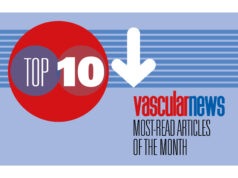
Halfway through its Controversies, Challenges and Consensus cycle, the Charing Cross Symposium will examine this year the numerous and varied challenges currently facing the vascular and endovascular field. The Symposium will be held from 26 to 29 April 2016 at Olympia Grand, London, UK.
This year’s Peripheral Arterial Challenges session will centre around management of the superficial femoral artery. Treatment strategies, varying depending on lesion type and length, will be analysed, with a special emphasis on the status and expectations of drug-coated balloons, drug-eluting stents, new biomimetic and swirling flow stents and stent grafts.
Delegates will be able to learn new techniques for femoropopliteal lesion treatment through attending the CX Peripheral Arterial Live Cases, which returns after its successful 2015 debut. This year’s live cases will be broadcast from Münster, Germany.
The main talking point of the 2016 Abdominal Aortic Challenges session is the presentation—for the first time—of 15-year follow-up data from the Endovascular Aneurysm Repair (EVAR) 1 Trial, the first EVAR vs. open repair abdominal aortic aneurysm trial to be conducted, and the first to reach fifteen-year follow-up. The 10-year data, presented at CX 2010, demonstrated no significant differences between endovascular and open repair in terms of mortality.
Another first-time presentation in the Abdominal Aortic Main Programme will be an Individual Patient Data meta-analysis of the EVAR vs. open repair randomised controlled trials—EVAR 1, DREAM, OVER and ACE.
On the third day, the Main Programme will be dedicated to challenges in the treatment of thoracic aortic diseases, with an emphasis on type B dissections. Also on the third day, the CX Aortic Edited Cases will explore the application of different techniques in complex thoracic aortic and abdominal aortic procedures. The format will be that of short case presentations followed by imaging and indications for the procedure, and will allow the audience to interact with the speakers and panel at every stage.
This year, the CX Venous Challenges Main Programme will, for the first time, take place on the Symposium’s opening day, exploring the use of various technologies and techniques for the treatment of superficial and deep venous disease with emphasis on the latest evidence of when and in which patients they should be used. The topics for discussion will include acute deep vein thrombosis and deep vein stenting challenges, proximal deep venous obstruction and pelvic vein reflux challenges. A new session on lymphoedema challenges will precede discussions on superficial venous challenges.
The ever-popular CX Venous Workshop will run throughout days two and three, consisting of one-to-one demonstrations by world-leading experts. The Workshop will expand on the technical aspects of the key superficial and deep venous topics discussed in the CX Venous Main Programme. This year, a new section on aesthetic phlebology will also be included in the workshop.
On the final day of this year’s Symposium, the Acute Stroke Challenges Programme—new as of 2016—will make its debut. The half-day Programme is being introduced following the realisation that a number of strokes are caused by interventions in the aorta and manipulations in the arch.
The purpose of the Acute Stroke Challenges Main Programme is to encourage a multidisciplinary approach, such that unwanted emboli to the brain can be managed by clot retrieval, and the optimisation of referral so that stroke patients reach the best hands as fast as possible.
The new CX Vascular Access Course will be held on the second, third and fourth days of the Symposium. The Course will provide both experts and those new to the field with invaluable insights into the challenges currently facing haemodialysis vascular access, and the methods used to overcome them. The three-day Course will bring together world experts to cover current practice and remaining challenges. It will be made up of a masterclass on ischaemic steal syndrome, a practical skills course and an abstract presentation day, immersing delegates in the most important issues and innovation in haemodialysis vascular access medicine.













